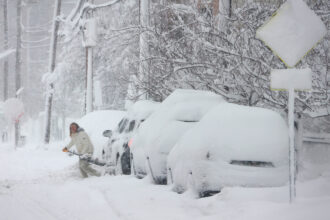Colorado and other states with ambitious climate change agendas said on Wednesday they fear gubernatorial elections in their states could dial back job-creating clean energy policy.
Several Republican candidates in the 37 governors’ races have suggested that they would undo renewable electricity standards (RES) that require a boost in cleaner-burning fuels if elected. They claim such measures harm the economy, chiefly through higher electricity bills, which is especially true in the Midwest and South, where solar and wind still lag behind the rest of the nation.
Colorado’s newest mandate, championed by Gov. Bill Ritter, orders utilities to get 30 percent of power from renewable sources by 2020. Supporters say the policy led to the creation of 20,000 new green jobs since 2004.
Ritter, who is not running for re-election, said it could be under attack.
“We have two different gubernatorial candidates … who have at various times have talked about how they would unwind this energy agenda,” Ritter told reporters on a conference call, outlining his concerns. They “seem to have very little sympathy, or very little sense, about the importance of renewable electricity standards.”
The “two” are Dan Maes, the Republican candidate, and Tom Tancredo, an Independent. The last voter survey from Rasmussen Reports published last week found that Tancredo, whose support has shot up 14 percent since August, is now within four points of frontrunner John Hickenlooper, the Democratic mayor of Denver.
Maes, marred by scandal, is in a distant third.
Tancredo wants “the free market to set prices for all forms of energy not to have politicians and bureaucrats choose winning or loosing technologies based what is popular.”
“The subsidy of solar and wind technology only proves who has the best media coverage,” his campaign website declares. Hickenlooper calls the 30 percent RES one of his “key priorities.”
If the public votes against green jobs, there is still big business, Ritter suggested. “The business community would be up in arms because we’ve been able to demonstrate job growth that’s directly correlated.”
The potent energy provision, he said, lured Vestas Wind Systems, the world’s biggest wind-turbine maker, to Colorado. “When we passed our renewable energy standard, Vestas made the decision within weeks to locate its first plant here.”
Since then the wind giant has invested over a billion dollars in four factories that will eventually create 2,600 jobs, the governor said.
Environmental groups are keeping a careful eye on the race.
“It’s a matter of watchful waiting to see what happens after the elections, and then very soon having discussions with people to figure out exactly what people are planning,” Charlie Montgomery, energy organizer for the Colorado Environmental Coalition, told SolveClimate News.
“We’ll see what happens on Nov. 2,” said Rob Sargent, energy program director of Environment America, a federation of state-based environmental groups. “But it’s not just a bunch of treehuggers” who are behind the RES in Colorado and other states, he told SolveClimate News. “It is a critical mass of stakeholders that ‘get’ the positive things that happened.”
Sargent said that governors wanting to “get rid of the RES” are going “to have to wrestle with the reality that there’s a lot of people that like these policies.”
Concern Spreads to Minn.
Still, similar fears are spreading in Minnesota, which has emerged as a clean energy leader in the Midwest.
“We are really worried,” said State Sen. Ellen Anderson (D-St. Paul). “It’s a real toss-up depending on who is elected governor.”
Minnesota adopted a mandate in 2007 under Republican Gov. Tim Pawlenty to get 25 percent of its power from renewables by 2020. Anderson said it would help support more than 20,000 jobs.
The GOP nominee for governor, Tom Emmer, a member of the State House of Representatives, voted against the measure, which had the support of over 90 percent of the legislature. In 2009, he introduced a bill that would bury it altogether, and earlier this year he sponsored legislation to take Minnesota out of the Midwestern cap and trade scheme.
“He’s a big climate denier. He’s called climate science Al Gore’s porn,” Anderson said, referring to a statement Emmer made in 2007 before the state legislature.
The latest Rasmussen Reports shows him in a virtual dead heat with Mark Dayton, a Democrat and former senator who has vowed to “make Minnesota the top state in the country for renewable energy development.”
Michael Noble, executive director of Fresh Energy, a nonprofit based in St. Paul, said Remmer would have a hard time dismantling the law.
“We built a coalition to pass the renewable energy standard in 2007 that included rural economic development interests, farm organizations, wind developers and … was joined by all the state’s electric utilities and the Minnesota Chamber of Commerce,” he told SolveClimate News.
“That kind of coalition and that kind of public support would be very difficult for a Gov. Emmer to reverse, should he be elected.”
2 Million Jobs at Stake, Group Says
As new energy proposals in Congress have collapsed in recent years, states and regions have been key actors on climate change.
The U.S. House narrowly passed a cap-and-trade bill in 2009, but backers failed to get it through the Senate. The issue of passing a federal RES has been contentious for years and seems a longshot for 2010.
Renewable energy advocates fear that without at least existing state efforts, the U.S. would fall further behind China, Germany, Spain and others in clean-technology manufacturing.
“The states are more important than ever,” said Kate Gordon, VP for energy policy at the Center for American Progress (CAP) Action Fund, a liberal research group.
For Gordon and her colleagues, killing state clean electricity mandates without a federal law looks dangerous. There’s “a lot at stake in the upcoming election,” Gordon said.
Thirty-five states now have some version of a RES. A study released on Wednesday by the CAP Action Fund said these rules combined would lead to the creation of more than two million jobs by around 2025.
The study was based on data from the U.S. Energy Information Administration, American Council on Renewable Energy and the National Renewable Energy Laboratory.
Gordon said Maryland, Ohio and Illinois are three of the states most at risk of rescinding their RES policies, as Republicans pick up steam in those tossup races. In Maryland, alone, the RES could create 50,000 jobs, the CAP report said.
“Republican candidates [in these states] have made clear that they do not support renewable energy policies that are currently in place, and currently creating many jobs in the construction and manufacturing sector,” she said.
Other state races could cause even more damage for global warming advocates, Gordon said.
“In Kansas, Minnesota and Oklahoma, candidates have expressed extreme skepticism about global warming’s existence and about any kind of policy to move the states forward in climate and energy policy.”
See also:
With 2 Weeks To Go, Green Groups Get Behind Clean Energy Election Push
Renewable Electricity Promotion Act of 2010 Introduced into Senate
Weak Renewable Energy Law Gets Big Push from Steelworkers, Green Groups
Congress Punts on Clean Energy Standards, Again
Study: National Renewables Mandate Could Help Make U.S. Competitive with China
About This Story
Perhaps you noticed: This story, like all the news we publish, is free to read. That’s because Inside Climate News is a 501c3 nonprofit organization. We do not charge a subscription fee, lock our news behind a paywall, or clutter our website with ads. We make our news on climate and the environment freely available to you and anyone who wants it.
That’s not all. We also share our news for free with scores of other media organizations around the country. Many of them can’t afford to do environmental journalism of their own. We’ve built bureaus from coast to coast to report local stories, collaborate with local newsrooms and co-publish articles so that this vital work is shared as widely as possible.
Two of us launched ICN in 2007. Six years later we earned a Pulitzer Prize for National Reporting, and now we run the oldest and largest dedicated climate newsroom in the nation. We tell the story in all its complexity. We hold polluters accountable. We expose environmental injustice. We debunk misinformation. We scrutinize solutions and inspire action.
Donations from readers like you fund every aspect of what we do. If you don’t already, will you support our ongoing work, our reporting on the biggest crisis facing our planet, and help us reach even more readers in more places?
Please take a moment to make a tax-deductible donation. Every one of them makes a difference.
Thank you,











